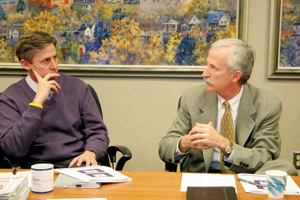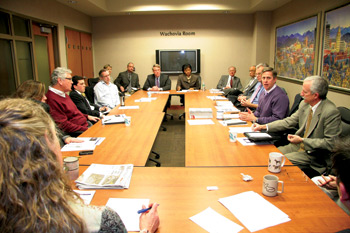Asheville Area Chamber of Commerce representatives sat down with city officials Feb. 17 to discuss how they might best cooperate during the coming year. Key topics included cheaper health care, landing one of Google's recently announced experimental fiber-optic networks, and using "the viral world" to promote tourism.

"The relationship with the Chamber is a great one, and what it does for the community is tremendous," Council member Jan Davis declared at the beginning of the meeting. The assembled officials went on to discuss the city's economic situation and their joint efforts to improve it.
The Asheville metro area lost 6,100 jobs between November 2008 and November 2009, reported Ben Teague of the Economic Development Coalition. Nonetheless, the area's 8.6 percent unemployment rate during that period was still well below the state's 10.6 percent figure, said Teague, noting that in the first quarter of 2010, about 2,000 jobs have been added or are in the process of being added by various companies.
"Health care and private education have stayed positive throughout the recession. Most of the other sectors of the economy have been fairly negative," he said. "It's a pretty diverse expansion. Most of it's driven by technology — you'll see call centers, distribution." Teague is executive director of the EDC, a public/private partnership promoting job growth and business activity.
Meanwhile, the Tourism Development Authority has its own initiatives, including a $1.6 million way-finding project designed to make downtown more navigable. The city contributed about $160,000 to the initiative.
"This way, instead of people with Ohio license plates ending up at the drum circle and going, 'Where am I?' they'll go, 'Oh, there's a parking deck," Kelly Miller, the Chamber's executive vice president (and a former City Council member) told the assembled officials.
The TDA is also looking to improve Asheville's tourism activity during off-peak months and in the areas of sports and weddings, in part by developing smart-phone applications and taking advantage of social networking.
"We're focusing on Web 3.0 apps to help people navigate downtown, to help with social networking," said Miller. "We want a voice screaming in the viral world: Come to Asheville."
Landing one of Google's proposed superfast broadband networks was another hot topic of discussion, with the city and the Chamber planning to cooperate on making their pitch.

"We're getting all these calls from people saying, 'Hey, I know someone in Google, let me help,' so we're tracking all the different ones down, having conference calls," said Teague. "We've asked Hunter Goosmann [of the nonprofit ERC Broadband] to spearhead this. We talk daily, nearly multiple times a day about it. He [had] a meeting [Feb. 18] with a Google official to get his opinion about where our presentation should go." Teague said more information would be revealed after officials from the Chamber, the city and the AdvantageWest regional economic-development group met to "decide how we can represent the city in the best way. There are some conflicting thoughts on whether [to do] a WNC application or a city of Asheville application. But it's definitely a great potential for the Asheville area."
"All the professionals are working on this," City Manager Gary Jackson chimed in. "The important thing is that we get this for the region; then we can work out the exact details."
Council member Gordon Smith urged his colleagues not to overlook the potential of other area residents to contribute to the effort.
"I know there are folks who are independent of any of these groups who are very excited about it, who are kind of waiting to hear from somebody what the most effective way is to activate this grass-roots energy," said Smith. "If you communicate with all of us as you become more aware, we can help get that rolling."
On the equally hot-button issue of health care, outgoing Chamber President Rick Lutovsky said that Buncombe is well-positioned to win state approval for an innovative experiment. The General Assembly, he explained, will authorize large employers in one area in the state to join forces in crafting money-saving health-care plans.
"We're getting together with doctors, lawyers, not-for-profits," said Lutovsky. "While others could jump in, none are as far along as we are. We are the experiment. In a nutshell, if large employers pool together, it gives an opportunity for small employers to get discounted health care. If anything happens at the national level, we could be at the forefront of that."
The state has set a December deadline for applications.
Mayor Terry Bellamy handed out copies of the city's strategic plan and said she welcomes future cooperation between the city and the Chamber.
"We're all for coming together to decide what we want to [collaborate] on, what we want to accomplish this year, especially for our state and federal legislative priorities as well as ongoing big-picture items," said Bellamy. "We're trying to be as effective as possible within our resources."



Before you comment
The comments section is here to provide a platform for civil dialogue on the issues we face together as a local community. Xpress is committed to offering this platform for all voices, but when the tone of the discussion gets nasty or strays off topic, we believe many people choose not to participate. Xpress editors are determined to moderate comments to ensure a constructive interchange is maintained. All comments judged not to be in keeping with the spirit of civil discourse will be removed and repeat violators will be banned. See here for our terms of service. Thank you for being part of this effort to promote respectful discussion.